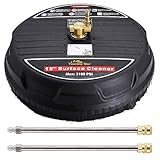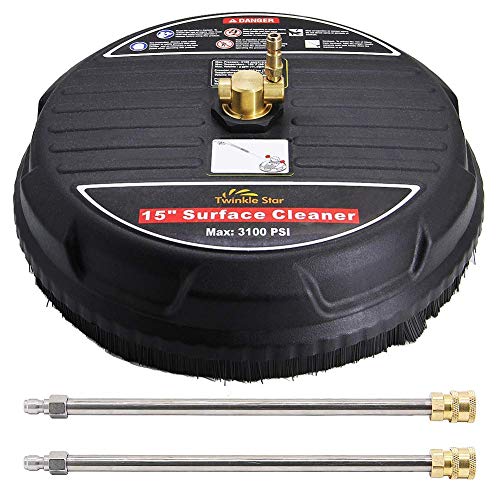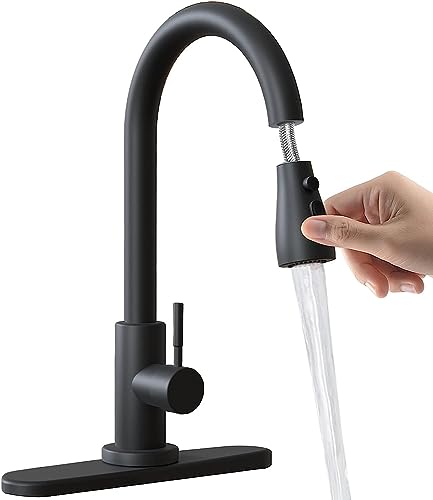Blog
How Strong Pressure Washer For Cleaning Brick

When it comes to cleaning brick, using a pressure washer can be a game changer. The powerful stream of water can easily remove dirt, grime, and stains, restoring the brick to its original beauty. However, not all pressure washers are created equal, and it’s important to know how strong of a pressure washer you need for cleaning brick.
Brick is a durable material, but it can also be delicate. Using too strong of a pressure washer can cause damage to the brick, such as chipping or cracking. On the other hand, using a pressure washer that is not strong enough may not effectively clean the brick, leaving behind stubborn stains and dirt.
So, how do you determine the right strength of a pressure washer for cleaning brick? It depends on several factors, including the condition of the brick, the type of dirt or stain you are dealing with, and the equipment you have available.
Generally, for light cleaning and routine maintenance, a pressure washer with a PSI (pounds per square inch) of 1500 to 2000 is sufficient. This level of pressure is strong enough to remove surface dirt and grime, but not too powerful to cause damage to the brick. For heavier dirt, stains, or moss, a pressure washer with a PSI of 2000 to 3000 may be needed. It’s important to start with a lower pressure setting and gradually increase if necessary, to avoid damaging the brick.
Why Choose a Strong Pressure Washer for Cleaning Brick?
When it comes to cleaning brick surfaces, a strong pressure washer is the best tool for the job. Here are a few reasons why:
- Removes dirt and grime: Brick surfaces often accumulate a lot of dirt, dust, and grime over time. A strong pressure washer can easily remove these stubborn stains, leaving your brick looking clean and vibrant.
- Efficient and time-saving: Cleaning brick manually can be a tedious and time-consuming task. A pressure washer speeds up the cleaning process significantly, allowing you to save time and effort.
- Reaches deep into crevices: Brick surfaces have many small crevices and gaps where dirt and debris can accumulate. A strong pressure washer can reach deep into these crevices, ensuring a thorough clean.
- Gentle on the brick: Despite its cleaning power, a strong pressure washer is still gentle enough not to damage the brick. It can effectively remove dirt without causing any harm to the surface.
- Restores the brick’s appearance: Over time, brick surfaces can become dull and stained. A pressure washer can revive the brick’s original appearance, making it look like new again.
Whether you need to clean the exterior of your house or a brick patio, choosing a strong pressure washer is the most effective and efficient way to get the job done. With its cleaning power and versatility, it will leave your brick surfaces looking clean and refreshed.
Increased Cleaning Power
When it comes to cleaning brick, having a strong pressure washer is essential. The increased cleaning power of a high-pressure washer can make all the difference in removing tough stains, dirt, and grime from the surface of the bricks.
A pressure washer with a high PSI (pounds per square inch) rating and a high GPM (gallons per minute) flow rate will have the strength and force needed to effectively clean brick surfaces. The high pressure of the water jet can penetrate deep into the pores of the brick, loosening and removing even the most stubborn dirt and stains.
The Importance of PSI
The PSI rating of a pressure washer indicates the amount of pressure the machine can deliver. For cleaning brick, a pressure washer with a PSI rating of at least 2000 is recommended. This level of pressure is strong enough to remove dirt and grime from the surface without causing damage to the brick itself.
However, it’s important to strike a balance between power and caution. Excessive pressure can damage the brick, causing cracks, chips, or even erosion. Therefore, it’s essential to use the appropriate nozzle and technique to ensure an optimal pressure that is effective for cleaning but gentle enough to avoid any damage.
The Benefits of GPM
In addition to PSI, the GPM flow rate of a pressure washer is also important for cleaning brick effectively. The higher the GPM, the greater the volume of water flow, which helps to rinse away loosened dirt and debris.
A high GPM flow rate ensures that the cleaning solution and loosened dirt are efficiently flushed away, leaving a clean and pristine brick surface. This is particularly important when dealing with larger areas of brick or heavily soiled surfaces.
Overall, the increased cleaning power provided by a strong pressure washer is crucial when it comes to cleaning brick. Choosing a pressure washer with the right PSI and GPM ratings will ensure that the cleaning process is effective, efficient, and safe for the bricks, resulting in beautiful and restored surfaces.
Effective Removal of Stubborn Stains
When it comes to cleaning brick surfaces, stubborn stains can be a real challenge. Fortunately, a strong pressure washer can effectively remove these tough stains and restore the cleanliness of your bricks.
Whether it’s oil stains, moss, mildew, or even graffiti, a high-powered pressure washer can provide the necessary force to lift and blast away these unsightly blemishes from your brick surfaces. The combination of high water pressure and the right detergent can penetrate deep into the pores of the bricks, loosening and dislodging any stubborn stains.
It is important to choose a pressure washer with enough power to tackle these tough stains. A pressure washer with a PSI (pounds per square inch) rating of at least 3000 is recommended for effective stain removal. Additionally, a pressure washer with an adjustable nozzle or a turbo nozzle can help to concentrate the water pressure on the stain for maximum cleaning power.
Before starting the cleaning process, it is essential to prepare the surface by removing any loose dirt or debris. A broom or a brush can be used to sweep away loose dirt, and a mild detergent mixed with water can be applied to the stained areas to further loosen the stains.
When using a pressure washer, it is crucial to maintain a safe distance and angle to avoid damaging the brick surface. Start by testing the pressure washer on a small, inconspicuous area to ensure that it does not cause any damage. Then, work in small sections, applying the high-pressure water in a sweeping motion, keeping the nozzle at a slight angle to the surface.
After thoroughly cleaning the stained areas, rinse the surfaces with clean water to remove any residual detergent or loosened particles. Allow the bricks to dry completely before assessing the results.
It’s important to note that while a pressure washer is effective in removing stubborn stains from bricks, it may not be suitable for all types of bricks or for heavily damaged surfaces. It’s always a good idea to consult with professionals or manufacturers for specific cleaning recommendations.
By using a strong pressure washer and following the recommended techniques, you can effectively remove stubborn stains from your brick surfaces, restoring their original beauty and cleanliness.
Time and Energy Savings
Using a strong pressure washer for cleaning brick can save you precious time and energy. With its powerful water jets, a pressure washer can easily blast away dirt, grime, and other tough stains from brick surfaces in no time. Traditional cleaning methods, such as scrubbing with a brush and detergent, can be time-consuming and labor-intensive.
Additionally, pressure washing is a more efficient way to clean larger areas like brick patios, driveways, or the exteriors of buildings. Compared to manually cleaning with a brush, pressure washing can cover a larger surface area in a shorter amount of time. This means you can finish your cleaning tasks more quickly and move on to other important activities or enjoy your free time.
Moreover, pressure washing can save you energy and effort. The strong force of the water jets does the hard work for you, eliminating the need for vigorous scrubbing or excessive scrubbing agents. This is especially beneficial for people with physical limitations or health conditions that may prevent them from engaging in strenuous activities.
|
$35.99
9 new from $24.99
6 used from $24.37
as of May 4, 2024 9:17 pm
Amazon.com
|
In conclusion, using a strong pressure washer for cleaning brick not only yields effective results but also saves you time and energy. It allows you to quickly and efficiently clean large areas while requiring less physical effort. Investing in a pressure washer can be a smart choice for individuals looking to maintain their brick surfaces without spending excessive time and energy on cleaning tasks.
Long-lasting Results
When cleaning brick surfaces, it is important to achieve long-lasting results that will keep your property looking fresh and well-maintained. One of the key factors in achieving these results is using a strong pressure washer.
A strong pressure washer provides the power needed to effectively remove dirt, grime, and stains from your brick surfaces. With the right pressure setting, it can penetrate deep into the pores of the brick, eliminating even the toughest stains.
However, it is important to choose the right pressure washer for cleaning brick surfaces. Using a pressure washer with too much pressure can cause damage to the bricks, leading to cracks and crumbling. On the other hand, using a pressure washer with too little pressure may not effectively remove all the dirt and stains.
To find the right pressure washer for cleaning brick, consider the PSI (pounds per square inch) and GPM (gallons per minute) ratings. A higher PSI rating indicates more power, while a higher GPM rating indicates a higher water flow rate. It is recommended to choose a pressure washer with a PSI rating between 2500-3500 and a GPM rating between 2.5-4.0 for cleaning brick surfaces.
Regular maintenance
Regular maintenance is also important to ensure long-lasting results when using a pressure washer for cleaning brick. After each cleaning session, make sure to clean the pressure washer itself, removing any dirt or debris that may have accumulated. This will prevent any build-up that could affect the performance of the pressure washer in the future.
In addition, it is recommended to apply a brick sealer after cleaning. A brick sealer helps to protect the brick surface from future stains and dirt, making it easier to clean in the future. Follow the manufacturer’s instructions for applying the sealer, ensuring that it is evenly distributed across the surface.
Professional assistance
If you are unsure about choosing the right pressure washer or applying a brick sealer, it may be helpful to seek professional assistance. Professional cleaners have the experience and knowledge to provide the best results for your brick surfaces, ensuring that they are thoroughly cleaned and protected.
By using a strong pressure washer, maintaining your equipment, and seeking professional assistance when needed, you can achieve long-lasting results when cleaning brick surfaces. This will keep your property looking clean and well-maintained for years to come.
Questions and answers,
What is a pressure washer?
A pressure washer is a machine that uses high-pressure water to clean surfaces. It has a motor that pumps water at a very high pressure, allowing it to remove dirt, grime, and stains from various surfaces.
Can I use a pressure washer to clean brick?
Yes, you can use a pressure washer to clean brick. However, it is important to use the right level of pressure to avoid damaging the brick. Brick is a porous material, so using too much pressure can cause it to crack or chip.
How strong of a pressure washer do I need to clean brick?
The strength of the pressure washer you need to clean brick will depend on the level of dirt and stains on the brick. In general, a pressure washer with a PSI (pounds per square inch) rating of 1500 to 2000 is sufficient for most brick cleaning tasks. However, if you have extremely stubborn stains or heavily soiled brick, you may need a pressure washer with a higher PSI rating.
Are there any precautions I should take when using a pressure washer to clean brick?
Yes, there are a few precautions you should take when using a pressure washer to clean brick. First, make sure to wear protective eyewear and gloves to protect yourself from debris and water spray. Second, test the pressure washer on a small, inconspicuous area of the brick to make sure it doesn’t cause any damage. Finally, hold the nozzle of the pressure washer at a distance of at least 12 inches from the brick surface to prevent excessive pressure and potential damage.
Can I use detergent with a pressure washer to clean brick?
Yes, you can use detergent with a pressure washer to clean brick. Using a mild detergent specifically designed for pressure washers can help to remove stubborn stains and dirt more effectively. However, make sure to follow the manufacturer’s instructions for mixing and using the detergent, as using too much or the wrong type of detergent can damage the brick.
Recent Posts
-
What To Use To Clean Vinyl House Pressure Washer
May 19, 2024 -
Does A Pressure Washer Need Water Pressure To Start
May 19, 2024 -
When Can You Stain A Deck After Pressure Washing
May 19, 2024 -
How To Take A Water Pump Off A Pressure Washer
May 18, 2024 -
What’s The Going Rate To Pressure Wash A Sidewalk
May 18, 2024


















